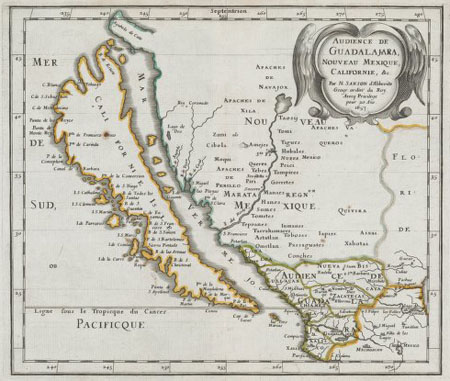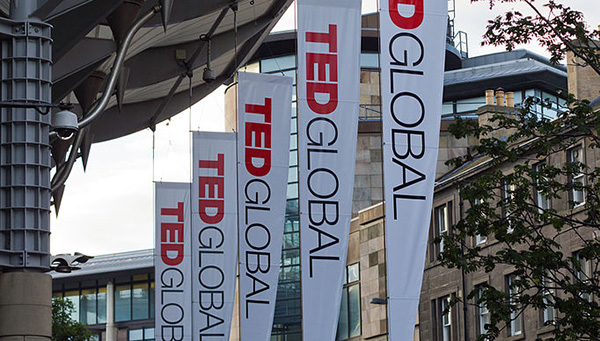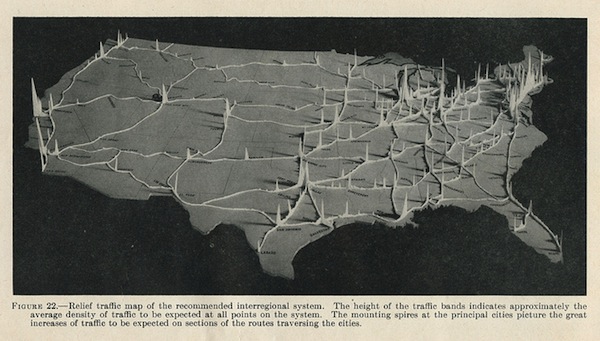Picking 100 mashups is a challenge in and of itself, and picking the 100 “best” even more so. Kudos to Keir Clarke for sifting through them. With such a big number, there are bound to be some so-so ones, but don’t let that distract you from the gems. Weather conditions along a route, crowdsourced neighborhood boundaries, global conservation maps, and more.
Battle over the front yard ∞
Steven Kurtz, reporting for the New York Times:
Gardeners aren’t generally known for their civil disobedience, yet in the last couple of years several have run afoul of local officials for tending vegetables in their front yards. In Ferguson, Mo., a stay-at-home father was ordered to dig up his 55 varieties of edible plants. In Tulsa, Okla., a gardener who didn’t want to remove her veggies and medicinal herbs saw them largely cleared by the city. In Oak Park, Mich., a mother of six named Julie Bass faced up to 93 days in jail for refusing to take out the raised beds in front of her home and plant what the city deemed “suitable” ground cover.
Come on people, this isn’t the 50s anymore. Let’s move on from the manicured lawn requirements.
Orangutan culture ∞
Rachel Widiss, reporting for ScienceNow:
Even when they are very young, orangutans may start to form ideas about their world — specifically, how and when to use certain tools. That’s the conclusion of a new study, which indicates that ape cultural traditions may not be that different from our own.
Nested sets ∞
David George Haskell:
This was a stroke of avian genius. No chipmunk or squirrel would be stupid enough to try to raid this nest.
Where there's money, there's corruption ∞
John Nicol and Dave Seglins, reporting for CBC News:
CBC News received several tips after a recent story about a company shipping the same load of biodiesel back and forth by CN Rail at a cost of $2.6 million in the summer of 2010. It turns out the shipments were part of a deal by a Toronto-based company, which made several million dollars importing and exporting the fuel to exploit a loophole in a U.S. green energy program.
Another reminder of New York's historical coastline ∞
Geoff Manaugh:
Some of my favorite architectural images of all time come from a series of photos taken by Fred R. Conrad for the New York Times, showing the remains of an 18th-century ship that was uncovered in the muddy depths of the World Trade Center site, a kind of wooden fossil, splayed out and preserved like a rib cage, embedded in the foundations of New York City.
California as an island ∞

Stanford recently acquired a collection of maps depicting California as an island—illustrated representations of what many in the U.S. assume is figuratively true, that the state is a world unto itself. But back when the original maps were drawn, people really did think California was an island. My grad advisor had an example in her dining room, and it was a fascinating thing to study.
Maps, then as now, were key pieces of military intelligence. The Spanish eventually figured out that California wasn’t an island. It took other colonial powers a bit longer, and Spain protected that classified detail. Eventually everyone realized that the Gulf of California wasn’t a strait. But the seed was sown, and, in a way, California remains an island to this day.
You Are the Real Winner Of the Mobile Maps Wars ∞
Rachel Metz, writing for Technology Review:
The fact that Google now has some major competition in an area that it pretty much owned previously is likely to make the company innovate more quickly and invest more seriously in making its own product better. In the end, neither Apple nor Google will win these “map wars”-consumers will.
Before GIS ∞
Eric Fischer found this relief map depicting the predicted traffic volumes of the “National System of Interregional Highways”, later known as the Interstate system. Another way of looking at this might have been, where should we build new train lines in addition to the Interstates? Sadly, that wasn’t the case.
Why Earth and atmospheric scientists are swearing up a storm and getting arrested ∞
Jonathan Mingle, writing for Slate:
Many of us have wondered at some point in almost precisely these terms: “Is Earth F**ked?” But it’s not the sort of frank query you expect an expert in geomorphology to pose to his colleagues as the title of a formal presentation at one of the world’s largest scientific gatherings.
Wild Horses Are Running Out of Room ∞
Dan Frosch, reporting for the New York Times:
Despite deep differences on how the animals should be managed, both sides agree on one thing: The situation has reached a tipping point.
These days, the temporary holding facilities and long-term pastures where many wild horses end up are nearing capacity or full. And the cost of caring for them has ballooned over the past decade.
Think about this problem. Now multiply it by hundreds, perhaps thousands of species. That’s where we’re headed.
What Do We Owe to the Next Species After Us? ∞
Lovely essay by Emma Marris at The Last Word on Nothing.
Even American Drivers Like Mass Transit More Than They Think ∞
Eric Jaffe, writing for the Atlantic Cities:
In an upcoming issue of the journal Transport Policy, a research duo reports that nearly 30 percent of regular car commuters in Boston and Cambridge, Massachusetts, gave up their full-time parking permits immediately after a brief free-transit trial, with most downgrading to an occasional permit and a few making a full switch to transit. About 25 percent had stuck with the change six months later.
Can technology save the environment? ∞
A healthy debate on an important topic.
Google releases Maps for iOS ∞
It’s an impressive app, but most reviews fail to ask, why didn’t Google do this in the past? Why didn’t they provide this level of data detail for the old maps app? Because they didn’t have to. Google essentially had a monopoly on mobile mapping, and they thought Apple had no choice but to use their service. Accept our terms or else.
Well, Apple called Google’s bluff. Say what you want about the bad PR Apple suffered from their maps, but they got Google to provide the mapping data needed so iOS users don’t feel like second-class citizens. Plus, now Google has a little competition. In the long run, we’ll all benefit from that.
City birds use cigarette butts to smoke out parasites ∞
Matt Kaplan, reporting for Nature:
“It really makes me wonder: might these birds show a preference for cigarette brands high in nicotine? If they did, that might suggest this behaviour has truly evolved as an adaptive response to challenges from parasites,” says Timothy Mousseau, an ecologist at the University of South Carolina in Columbia.
How TED and The City 2.0 took the internet for a ride

Last year, TED made a lot of noise when it announced that it was awarding its TED Prize to something called “The City 2.0”. In case you don’t know what “The City 2.0” is, it’s an idea. At least that’s what TED was telling us. They were awarding the prize to an “idea” instead of a person, sort of like when Time Magazine goes all crazy and awards the Person of the Year to a machine.
Well, TED isn’t about machines, but it is all about ideas, so it gave its award to an idea, which was really like giving an award to itself, which as you’ll see in a bit is actually a more accurate statement than you’d think. Did I mention that this idea had a website? It does. One that TED designed and built themselves. Well, half-built. See, it wasn’t exactly ready when the TED Prize was announced, which is funny because TED both built the site and gave the award.
The humdinger behind the original The City 2.0 ¹ was that people could use the site to start grass roots campaigns to change their neighborhoods and cities. The idea was that “the reach of the cloud” and “the power of the crowd” would join forces and, from that totally awesome buzzword high-five, ten winners would emerge.
Wait, ten winners? Didn’t an idea already win the prize? Turns out that even though an idea can have a website, it can’t accept $100,000. Well, it could if TED, which came up with the idea for The City 2.0, had awarded the money to itself, but that would just look tacky. So instead they split up the $100,000 with the intent of awarding it to those ten winners who would bubble up from the cloudy crowd.² I’m not sure how the cloudy crowd picks the best ideas, but at the time I guessed it would have something to do with voting, as most cloudy crowds do.
This is the awkwardly placed paragraph where I say that I reached out to The City 2.0 for comment because I felt like I had to and because I actually did. They haven’t responded, not even a “no comment” or anything.
With a whole $10,000 on the line, I’m sure TED was expecting the The City 2.0 to be a hotbed of entrepreneurial activity. It wasn’t. Two months after the prize was awarded, I checked back. The site was finished, but it didn’t seem like anybody else knew that. There were just 124 ideas, most of which only had one or two votes in favor of them. Less than two months remained until TED Global, the event where the ten winners were supposed to be announced.
To be fair, there were a few ideas that were winners, some of which would go on to be actual winners, but they still weren’t announced at TED Global. (How these winners were determined I do not know because the only thing on the site about them was a handful of lousy sentences.) Most, though, were definitely not good. Some were rehashes of city council debates:³
Livable Elgin Parkway
Eglin Pkwy in Ft Walton is a 7 lane high speed road. In order to foster development / creativity, this could be reduced to a 2 lane road. Through traffic should be redirected to a high speed location.
Others didn’t even bother mentioning cities or local issues:
Creating a Viable 3rd Party
Democrats=Republicans
And my favorite?
Make the public aware of City2.0 [sic]
In order for this to become a reality local residents need to be made aware of The Wish.
Umm, guys, you realize anybody can read this, right?
You know how you feel when you see someone do something embarrassing and you feel embarrassed for them? That’s how I felt for The City 2.0.
Well, the TED people aren’t idiots. They know a failed venture when they see one, so they quietly pulled the plug on “The City 2.0” and rolled out… “The City 2.0”.⁴ The, um, 2.0 version of the site scrapped the map and didn’t show people’s submissions, because, like, some people’s ideas are totally lame and we don’t want that messing up our snazzy website we dropped a lot of coin on. In it’s place were “stories” that were selected by TED along with random urbanist links. That’s, like, totally better.
Did you know that October 13 was TEDxCity2.0 Day? Neither did I, and one of the supposed TEDxCity2.0 ⁵ events was in Boston, just two miles from where I live. It had people talking about leadership and Mars and poetry and financial markets and communication and aerodynamics and mind reading but it didn’t have anyone talking about cities. Huh.
To date, TED has awarded eight of its ten prizes, five of which were given to projects that had already existed before The City 2.0 got all spendy. That’s not to say the winners don’t deserve it—they’re great projects—but it’s not exactly the crowdsourced, spontaneous wonderland what TED led us to believe The City 2.0 would be about. Two more are supposed to be awarded in November and December. It’s December already.
One of the things that upsets me about The City 2.0 isn’t that it was a half-baked idea with a sucky website that dozens of other organizations were already doing way better. Or that it was a transparent marketing ploy meant to draw more attention to TED than to the issue. Or that there was absolutely zero transparency about how winners were going to be selected despite pandering to the “crowd” and its infinite wisdom. No, what gets me is that so many people bought into it. ArchDaily ran such a breathless piece that I almost mistook it for a press release.⁶ The Atlantic Cities ran a laudatory article. Inhabitat, too.
Well, not everyone was buying it. The Next American City was doubtful—at first. They wrote a bit about how The City 2.0 was a major letdown, man. But later, they heard about the relaunch of The City 2.0 somehow, wrote a nice piece about it, and ended up winning one of the ten The City 2.0 awards. I also wrote a skeptical piece about The City 2.0 way back when, but I didn’t hear about the relaunch and didn’t write a nice piece about it and didn’t win an award.⁷
I shouldn’t be surprised by all of this. In fact, I’m not. I know TED is a marketing machine and that its only real interest is making sure that the TED name is everywhere. I mean, what else can you expect from a conference that’s feels the need to address its own elitism? But that doesn’t make me any less angry. Angry that TED exploited the rampant churnalism⁸ that’s so prevalent on the internet. Angry that so many people bought into TED’s hokey and transparently vain message. And angry that TED would so arrogantly presume to fix something as complex as the city without giving it any more thought than would a few fresh-faced marketing graduates.
- They obviously didn’t have any better ideas for a name. Oh, and all links in this article to the original version of the site are from a publicly viewable development server. It looks marginally worse than the actual site did at the time, but all the data stored on the dev server is legit.↩
- Apparently, TED has run out of famous wealthy people to give their prize to, so they settled on ten less famous and less wealthy people. Maybe because less wealthy people are more easily wowed by less money? ↩
- Have you ever been to a city council meeting? People can get angry there. I once saw a guy punch his own dog! Not really, though. But I can totally imagine it happening. ↩
- Someone should tell them how version numbers work. ↩
- GASP! That’s a long acronym. ↩
- Somewhere, a stenographer just got his wings. ↩
- NOTE: Correlation ≠ causation. In case you didn’t know that because you haven’t taken statistics or don’t read Slashdot. ↩
- Churn + journalism. Lots of news and yet somehow no actual news. Sort of like CNN. ↩
Photo by Stefan Schäfer, Lich.
Related posts:
Sandy, before and after ∞
Exactly what it sounds like. Some of the changes are striking.
About those 100-year flood zones ∞
Michael Howard Saul, writing for the Wall Street Journal:
Two-thirds of all New York City homes damaged by superstorm Sandy were outside of the Federal Emergency Management Agency’s existing 100-year flood zone, Mayor Michael Bloomberg said Thursday, calling for an immediate redrawing of the maps to reflect current conditions.
New York City isn’t the only place with this problem. 100-year flood zones are horribly out of date.
You're subsidizing your cable company ∞
Elisabeth Rosenthal:
Facing the prospect of regulation by the Environmental Protection Agency, cable TV operators and appliance manufacturers have announced a voluntary program to improve the energy efficiency of the set-top boxes that bring programming into your home. Some environmental advocates say the changes don’t go nearly far enough.
I’m skeptical, too, because the market dynamics in the cable industry are totally backwards, especially when it comes to set-top boxes. You’d think the end user would be the consumer in that equation, but they’re not. It’s the cable companies. They buy the boxes and force people to rent them. And they give the end users no control over how much power the devices consume.
This means end users are subsidizing cable companies with about $2 billion in electricity annually, all so cable companies can push advertising to the boxes.
